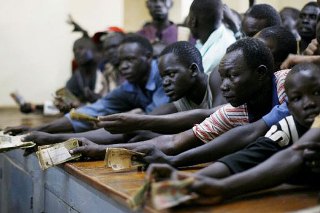South Sudan’s austerity measures cut down on civil servants
June 19, 2012 (JUBA) – Civil servants in South Sudan are expected to be negatively affected by the country’s recently introduced austerity measures as a result of the halting of oil production in January.

The budget which was passed by the executive since last week proposed the reduction of civil servant’s housing allowances by 50 per cent, freezing their incentives and laying off some, when necessary.
South Sudan shut down its oil production, which provided 98 per cent of overall revenues, in response to what it said was stealing of the oil by Khartoum as it passed through Sudan’s pipelines to its Red Sea port. Khartoum said it acted in response to non-payment of transit fees by South Sudan.
Khartoum has also introduced austerity measures as a result of the oil shut down. It cut down on the size of the government, particularly the executive and legislatures; merged many of the ministries; and removed the positions of deputy ministers; while promising to increase the income of poor households.
The executive cabinet in South Sudan has about 60 ministers and deputy ministers with a bicameral parliament of 450 members, representing 8 million citizens.
There are fears in South Sudan that targeting the civil servants with the austerity measures by cutting down on their allowances and incentives may significantly affect the livelihood of many South Sudanese citizens who rely upon government wages.
The austerity measures also apply to the army, with similar cuts proposed.
The new nation is currently using its reserves to pay the salaries which may dry up by September.
President Salva Kiir last week revealed that 75 former and current senior officials of his government were responsible for the stealing of US$4 billion during the last seven years and asked them to return the money to the government’s coffers.
South Sudan is also looking for foreign loans in order to finance some of the significant service delivery and infrastructural projects.
(ST)
